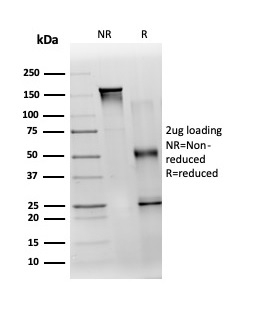Free Shipping in the U.S. for orders over $1000. Shop Now>>

SDS-PAGE Analysis of Purified TDRKH Mouse Monoclonal Antibody (PCRP-TDRKH-1H2). Confirmation of Purity and Integrity of Antibody.

Immunofluorescence analysis of PFA-fixed HeLa cells. TDRKH Mouse Monoclonal Antibody (PCRP-TDRKH-1H2) followed by goat anti-mouse IgG-CF488 (green). CF640A phalloidin (red).

Flow cytometric analysis of PFA-fixed HeLa cells. TDRKH Mouse Monoclonal Antibody (PCRP-TDRKH-1H2) followed by goat anti-mouse IgG-CF488 (blue), unstained cells (red).

Formalin-fixed, paraffin-embedded human ovarian carcinoma stained. TDRKH Mouse Monoclonal Antibody (PCRP-TDRKH-1H2) at 2ug/ml. HIER: Tris/EDTA, pH9.0, 45min. 2°C: HRP-polymer, 30min. DAB, 5min.

Analysis of Protein Array containing more than 19,000 full-length human proteins using TDRKH-Monospecific Mouse Monoclonal Antibody (PCRP-TDRKH-1H2). Z- and S- Score: The Z-score represents the strength of a signal that a monoclonal antibody (MAb) (in combination with a fluorescently-tagged anti-IgG secondary antibody) produces when binding to a particular protein on the HuProtTM array. Z-scores are described in units of standard deviations (SD's) above the mean value of all signals generated on that array. If targets on HuProtTM are arranged in descending order of the Z-score, the S-score is the difference (also in units of SD's) between the Z-score. S-score therefore represents the relative target specificity of a MAb to its intended target. A MAb is considered to specific to its intended target, if the MAb has an S-score of at least 2.5. For example, if a MAb binds to protein X with a Z-score of 43 and to protein Y with a Z-score of 14, then the S-score for the binding of that MAb to protein X is equal to 29.
Participates in the primary piRNA biogenesis pathway and is required during spermatogenesis to repress transposable elements and prevent their mobilization, which is essential for the germline integrity. The piRNA metabolic process mediates the repression of transposable elements during meiosis by forming complexes composed of piRNAs and Piwi proteins and govern the methylation and subsequent repression of transposons. Required for the final steps of primary piRNA biogenesis by participating in the processing of 31-37 nt intermediates into mature piRNAs. May act in pi-bodies and piP-bodies by transferring piRNA precursors or intermediates to or between these granules.
There are no reviews yet.